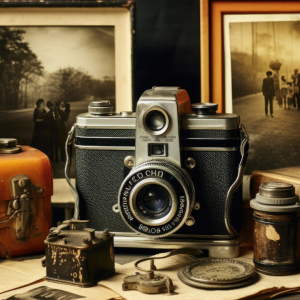Have you ever found yourself drawn to certain objects, spending hours searching for that perfect addition to your collection? Whether it's rare stamps, vintage toys, or limited-edition memorabilia, the act of collecting is more than just a hobby—it's a deep-seated psychological and neurological process. But why do humans feel such an intense urge to collect? What makes us "wired" to seek out these treasures?
In this article, we’ll explore the psychology and neuroscience behind collecting, uncovering how dopamine, sentimental attachment, and other factors drive this fascinating human behavior. We'll also share scientific insights that explain why certain individuals feel a stronger pull to collect, and how Collectiblepedia enhances your collecting journey by fostering community connections and providing rich, informative content.
1. The Dopamine Reward System: A Collection of Pleasure
When we think about what makes collecting so addictive, it’s impossible not to mention dopamine—the brain’s “feel-good” chemical. Dopamine is released when we experience pleasure, excitement, or even anticipation. For many collectors, the act of acquiring new items triggers a surge of dopamine, reinforcing the behavior and making us want to collect more.
Why Dopamine Plays a Key Role:
- Anticipation and Reward: Research suggests that the anticipation of acquiring a new collectible, not just the actual acquisition, is enough to trigger a dopamine response. This explains why collectors often feel a rush when they find something rare, even if it hasn’t yet arrived at their doorstep. The thrill is in the hunt!
- Completionism: Dopamine also reinforces a sense of achievement when completing a set or reaching a collecting milestone. For instance, completing a collection of rare comic books or limited-edition sneakers often creates a sense of satisfaction and well-being.
Studies such as the one published in Frontiers in Psychology show that dopamine levels rise significantly in response to anticipation, providing the psychological reward of collecting (Source: Frontiers in Psychology).
2. Sentimental Attachment: The Emotional Bond to Objects
Collecting isn’t just about the objects themselves—it’s about the emotional connection we form with them. Many collectors speak of a sentimental attachment to the items they gather, which can evoke feelings of nostalgia, personal significance, or even memories of childhood.
How Emotional Bonds Are Created:
- Memory and Nostalgia: For many people, collecting certain items is tied to memories from their past. Collecting baseball cards, for example, may remind someone of watching games with their father. This sentimental connection can transform ordinary objects into irreplaceable treasures.
- Identity and Expression: Objects can become extensions of our identities. A collector may feel a deep sense of pride in showcasing their collection, using it to express who they are or what they value. This is particularly common in collectible subcultures such as vintage toy collecting or high-end sneaker culture.
Psychologist Erik Erikson has discussed how the things we collect often become symbols of our personal journey and milestones (Source: Psychology Today).
3. The Social Aspect of Collecting: Building a Community
While collecting can be a solitary activity, it often leads to strong social interactions. Whether it’s joining a forum, attending an auction, or meeting fellow collectors at conventions, many collectors find immense satisfaction in connecting with others who share their passion. Community plays a significant role in enhancing the experience of collecting.
The Social Influence:
- Shared Interests: Collectors often find joy in discussing their collections, sharing tips, and exchanging stories with others. This social reinforcement encourages more collecting and helps collectors gain insights into new trends and valuable pieces.
- Collaborative Collecting: Many collectors also trade, buy, and sell with others in order to complete or enhance their collections. These exchanges form the foundation of a vibrant collecting community, where trust and reputation are vital.
At Collectiblepedia, we understand how important community is to collectors. Our platform provides a space for collectors to connect, exchange knowledge, and share their experiences. Join our community to dive deeper into the world of collectibles, find information, and meet like-minded individuals!
4. The Role of FOMO (Fear of Missing Out) in Collecting
For many collectors, the fear of missing out (FOMO) can be a driving force. The idea that a valuable item might slip through their fingers often leads to a sense of urgency in acquiring it. FOMO is common in markets like limited-edition releases, where the anticipation and rarity of an item drive demand.
How FOMO Fuels Collecting Behavior:
- Scarcity and Exclusivity: The rarity of a collectible often increases its perceived value, prompting people to collect quickly before they are gone forever. This psychological factor is particularly evident in artworks, sports memorabilia, and vintage items.
- Competitive Collecting: As certain items become more sought after, the competition between collectors heightens. This can further reinforce the urge to collect, as individuals fear being left behind in an ever-changing marketplace.
5. Collecting as a Coping Mechanism
In some cases, collecting can also serve as a coping mechanism to deal with stress, anxiety, or feelings of emptiness. For some, the act of acquiring objects provides comfort, control, and a sense of purpose.
Collecting and Mental Health:
- Control and Order: The act of organizing a collection can offer a sense of control in an otherwise chaotic world. Whether it's neatly arranging toys or cataloging rare coins, collectors find peace in having their items in order.
- Escaping Reality: For certain collectors, immersing themselves in the world of collectibles offers an escape from the pressures of daily life. This aspect of collecting can provide a healthy outlet for stress relief and emotional support.
Collecting—More Than Just a Hobby
The science of collecting goes far beyond simply gathering items. It taps into deep psychological and neurological processes, from the dopamine rush to the emotional attachment we form with objects. Whether driven by nostalgia, the joy of finding something rare, or the need to belong to a community, collecting fulfills a wide array of human needs.
At Collectiblepedia, we celebrate the science and joy behind collecting by providing a rich resource of information, connecting collectors with valuable knowledge and fostering a vibrant community. Our platform is designed to enhance your collecting experience, whether you’re looking to expand your collection or simply connect with others who share your passion.
Join the Collectiblepedia community and delve deeper into the world of collecting. With our wealth of information and engaging community, we are here to help you explore and grow your collection!
🔗 Discover more about collecting at Collectiblepedia
Understanding why we collect can make the experience even more fulfilling. So, whether you're in it for the thrill of the hunt or the connection to the past, collecting will always be a fascinating part of human nature. Happy collecting! 🌟







